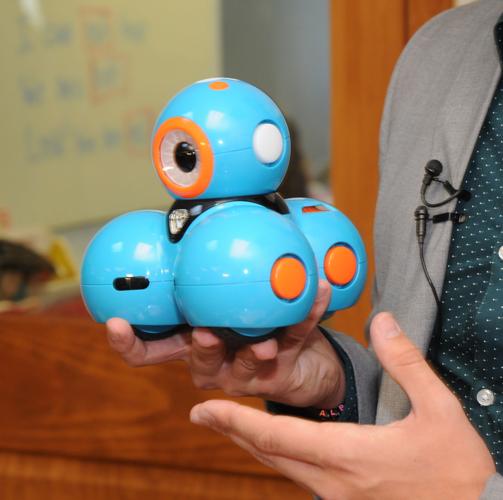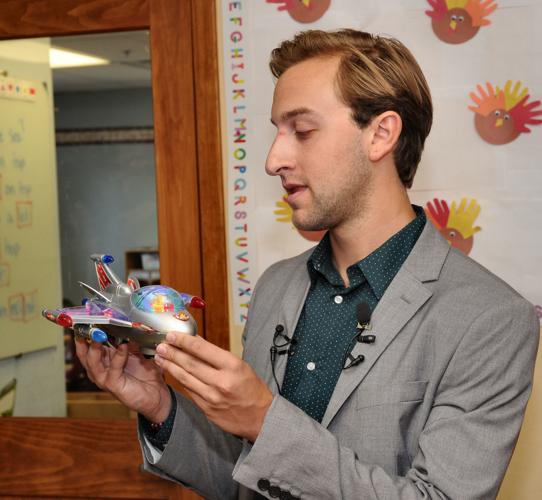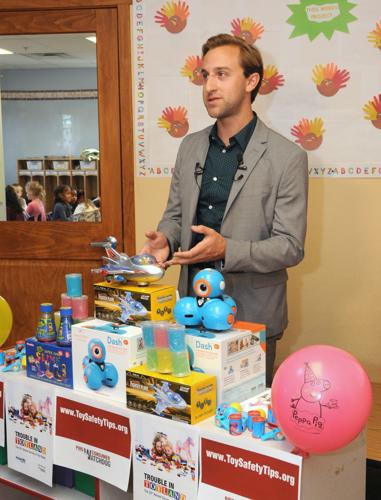PHOENIX — It was bad enough when parents had to worry about choking hazards, poisonous chemicals and excessive noise when buying presents.
Now add privacy to the list.
In it’s annual “Trouble in Toyland” report, the Public Interest Research Group is taking on the latest generation of toys that use artificial intelligence to not only interact with children but can connect with the Internet.
Put simply, according to Aaron Kane, the organization’s field associate, they listen — and can collect information on what they hear and how the child is using the toy not only to the company that made them but to others, including advertisers.
“They may endanger a child’s privacy” by keeping track of a person’s activity, habits and personal data, Kane said at a press conference Tuesday in Phoenix.
And Kane said it may not stop there: Like other Internet-connected devices, they can record conversations within earshot.
He specifically cited a product called Dash, which manufacturer Wonder Works says can interact with and respond to surroundings. It is designed for children 6 and older.
The company’s website says certain “product use information” is automatically transmitted to the firm and is “used to provide support, improve our products and services, and form similar activities that support our internal operations.”
But in a prepared statement, Vikas Gupta, the company’s CEO, said the PIRG claims are false.
“Our apps and robots do not share children’s data with third parties and we are fully compliant with the Children’s Online Privacy Protection Act,” he said.
There is, however, a different privacy issue: Even the company’s website warns that user-created content, including voice recordings, remain stored within the robot and can be played by anyone else who subsequently gets the toy. And it informs parents to contact the company to learn how to remove such information before getting rid of the toy.
This year’s toy report also has a special emphasis on “slime” products, what with gooey, gross-out messes always attractive to children.
The problem, according to the report, is that some versions have high concentrations of boron — up to 4,700 parts per million.
There are many legitimate uses for boron, which is the basis of detergents like borax and is used in glass manufacturing and pesticides.
Where it becomes an issue, Kane said, is when ingested, where it can cause nausea, have long-term effects on reproductive health and, in high enough doses, be fatal.
While there are limits for boron in drinking water, the Consumer Product Safety Commission has not set any safe levels for products meant for children. And manufacturers don’t list concentrations on the labels, as they’re not meant for internal consumption.
In the meantime, one option for parents remains do-it-yourself-slime, with various recipes online involving glue and things like baking soda and food coloring.
Then there’s the question of sound.
What kid wants to play with an airplane that doesn’t make noise?
“We agree that toys should have sound,” Kane acknowledged.
“But there’s a certain level where the decibels can cause hearing damage,” he said. “A small, small child might hold it up to their ear and cause hearing damage.”
Ideally, Kane said, manufacturers would limit the noise levels. But short of that, he said parents can put a piece of tape over the speaker to deaden the volume.
The report also contains the usual warnings about choking hazards for infants. In general, the rule is that if a product — or parts of a product that can fall off — can fit through a toilet paper tube, it can lodge itself in a baby’s throat.
Read the group’s report at uspirg.org/feature/usp/trouble-in-toyland






